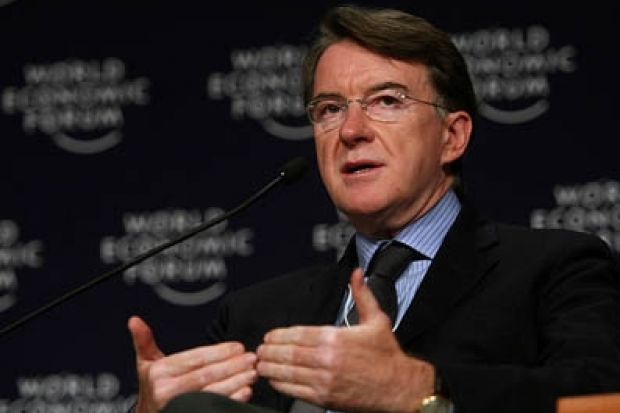Lord Mandelson, the head of the new Department for Business, Innovation and Skills, has responded to criticisms that universities will become a mere arm of business under his new “super ministry”.
The department was created last week through the merger of the Department for Innovation, Universities and Skills (DIUS) and the Department for Business, Enterprise and Regulatory Reform (BERR).
Told by Times Higher Education that universities had reacted with “horror” to news that the business department would take over responsibility for higher education policy, Lord Mandelson claimed that this was “absolutely untrue”.
“I spoke yesterday to [Universities UK president] Rick Trainor who expressed no horror whatsoever,” he said. “And I have received three messages from high-placed friends in different universities and they are delighted that universities should be at the heart of government and they look to me to be a powerful advocate of their interests and needs and that is exactly what I am going to be.”
Asked whether universities should now consider themselves “agents of business” in the new department, Lord Mandelson said that he neither understood nor accepted the premise of the question.
“Why on earth should that change the way universities regard themselves?” he asked. “Universities contribute as much to the character of our society and the development of individuals in society as they do to the competitiveness of the economy. Those things are not mutually exclusive. I don’t see why they should regard them as alternatives.”
The exchange followed Lord Mandelson’s first speech since taking over the new ministry. In the speech, which focused on science, Lord Mandelson said that the new department put science at the centre of Britain’s future prosperity. The vision was to continue to invest in it, commercialise it and build new industries on the back of it.
He said that government needed to create “proper frameworks” for business to operate in and the new department “by and large” brought together all the “policy levers” necessary to secure the UK’s competitive future.
The speech focused heavily on how scientific discoveries could be spun out into businesses that created jobs and markets.
“The value of…knowledge and our ability to turn it into growing businesses is going to matter much, much more in the coming decade as we face fiercer and fiercer competition from the emerging economies,” he said, “All around us are examples of Britain’s ability to take a good idea and turn it into an enterprise that creates jobs and opportunities for people beyond the workshop and beyond the laboratory. And that [is the] strength on which the new department is going to be focused on building,” he said.
He said that applied research “will obviously receive greater emphasis” but stressed fundamental science was important as well and any research base needs to include “a substantial element of fundamental curiosity-driven research”.
“Anyone who thinks that an emphasis on economic impact needs to take place at the expense of fundamental science is wrong,” he said.
He stressed that the science budget was “ring fenced”, that he and the science minister, Lord Drayson, were both “committed to protecting it and raising investment further” and the Prime Minister was “not a bad ally” to have to do so.
On concerns that science was being short-changed by having a minister who also operated in the Ministry of Defence – Lord Drayson will split his responsibilities between his post as minister for science in the new department with a ministerial position in the Ministry of Defence with responsibility for research and procurement - Lord Mandelson said the “overwhelming bulk” of his time would be spend attending to his portfolio as science minister.
“I would not read too much into that if I was you… I think you will find that he is a spokesman for the MoD in the Lords rather than a minister who is going to be devoting the bulk of his time to that department.”
Lord Drayson yesterday used the social messaging site Twitter to respond to concerns about his dual role, including whether it was “ethical” to bring science and military spending together.
Before taking on the science portfolio, Lord Drayson was minister for Defence Procurement, which he left to pursue his passion for motorsport. The Ministry of Defence has the largest research and development budget of any government department, spending approximately £2 billion a year. Combined with the research councils’ budget, it will leave Lord Drayson responsible for about £5 billion a year of government science spending.
In his replies, Lord Drayson admitted that critics “have a point” about the ethical issues.
“I have to be absolutely clear on the separation between the 2 roles. Civil service r key,” he tweeted.
He also tweeted that his dual roles would give science “more influence” within government and help the departments to “work together better”. “I really believe science agenda is stronger now in govt than ever. Its up to me to prove it though in the future,” he tweeted.
Register to continue
Why register?
- Registration is free and only takes a moment
- Once registered, you can read 3 articles a month
- Sign up for our newsletter
Subscribe
Or subscribe for unlimited access to:
- Unlimited access to news, views, insights & reviews
- Digital editions
- Digital access to THE’s university and college rankings analysis
Already registered or a current subscriber? Login
